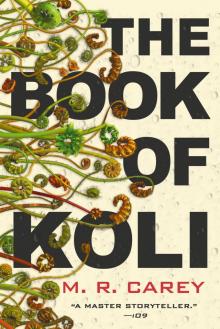- Home
- M. R. Carey
The Girl With All the Gifts Page 24
The Girl With All the Gifts Read online
Page 24
To reveal that she came out twenty-seventh on the list of possible crew members for Charlie and Rosie. Trained for five months in the operation of the on-board systems, only to be told that she wouldn’t, after all, be required. Twenty-six other biologists and epidemiologists had placed higher up the list – had seemed, to the mission’s managers and overseers, to possess more desirable skills and experience than those Caldwell had to offer. Since the full complement of scientists for both labs was twelve, that didn’t even put her on the list of first alternatives. Charlie and Rosie sailed without her.
Until now, she’d assumed that they’d gone down with all hands – lost in some inner-city fastness, unable to advance or retreat, overwhelmed by hungries or ambushed by junker scavengers. That thought had consoled her a little – not to think that those who’d beaten her had then died for their lèse majesté, but because her placing so low on the list had kept her alive.
Of course, that’s only a conceptual stone’s throw from the thought that her survival is a side effect of mediocrity.
Which is nonsense, and will be seen to be nonsense, when she finds the cure. The story of her failing to gain a berth on Charlie or Rosie will be an ironic footnote to history, like Einstein’s alleged bad grades in high-school maths exams.
Only now, the footnote gains an added piquancy. They made this lab for her all along, and they didn’t know it. They sent it here to intercept her journey.
Parks and Gallagher are working the crank, which was too stiff and unyielding to move when Caldwell tried it. The door is sliding back, a half-inch at a time. Stale air leaks out, making Caldwell’s heart beat fast in her chest. The seal is good. Whatever happened here, whatever may have become of Rosie’s crew, her interior environment appears to be sound.
As soon as the gap is wide enough for her to get through, Caldwell steps forward.
Right into Sergeant Parks, who refuses to stand out of her way. “I’m going in first,” he tells her. “Sorry, Doc. I know you’re keen to take a look at this thing, and you will. Just as soon as I check if anyone’s home.”
Caldwell starts to state her reasons for believing that Rosie will be empty, but the sergeant isn’t listening. He’s already gone inside. Private Gallagher stands by the door and watches her warily, clearly afraid that she’ll try to barge past him.
But she doesn’t. If she’s right, there’s no risk, but for the same reason no real need for hurry. And if she’s wrong, if the vehicle has been breached somehow, then the sergeant will certainly deal more effectively with anything that’s inside than she could hope to do. Common sense dictates that she wait for him to complete his search.
But she almost convulses with impatience. This gift is intended for her, and for no one else. There’s nobody else who can use what’s in there. What might be in there, she corrects herself. After so many years, there’s no telling what could have happened to the precious equipment in Rosie’s labs. After all, what conceivable disaster would have taken out the crew without harming anything around them? The most likely explanation for the sealed door and undamaged exterior is that one or more of the crew became infected while on board. She imagines them running amok through the lab, in a feeding frenzy, toppling delicate imaging frames and centrifuges, trampling on Petri dishes full of carefully incubated samples.
Sergeant Parks emerges, shaking his head. Caldwell is so wrapped up in these disaster scenarios that she takes that for a verdict. She cries out and runs for the door, where Parks steadies her with a hand on her shoulder. “It’s fine, Doc. All clear. Only body is in the driving seat, and he seems to have shot himself. But before we go in there, tell me something – because this thing is way outside of my experience. Is there anything in there I should know about? Anything that could be dangerous?”
“Nothing,” Caldwell says, but then – the punctilious scientist – she amends that. “Nothing I’m aware of. Let me look around, and I’ll give you a definitive answer.”
Parks steps aside and she goes in, feeling herself trembling, trying to hide it.
The lab has everything. Everything.
At the far end, facing her, is something she’s only ever seen in photographs, but she knows what it is, and what it does, and how it does it.
It’s an ATLUM. An automated lathe ultramicrotome.
It’s the holy grail.
52
Rosalind Franklin seems to thrill Dr Caldwell and Sergeant Parks, no doubt for different reasons, but Helen Justineau’s first impressions are negative. It’s cold as hell, it echoes like a tomb, and it smells like embalming fluid. And she can see from Melanie’s face that Melanie is even less enthusiastic.
Of course, they’ve both got recent and unhappy memories of laboratories, especially laboratories with Caroline Caldwell in them. And that’s what Rosie, as Caldwell calls this thing, really is – a lab on wheels. Only it’s got sleeping berths and a kitchen, so it’s also a gigantic motor home. And it’s got flame-throwers and turret guns, so it’s also a tank. There’s something for everyone.
In fact, it’s almost big enough to cross time zones. The lab is amidships and takes up nearly half the available space. In front of it and behind it there are weapons stations where two gunners can stand back to back and look out to either side of the vehicle through slit windows like the embrasures in a medieval castle. Each of these stations can be sealed off from the lab by a bulkhead door. Further aft, there’s something like an engine room. Forward, there are crew quarters, with a dozen wall-mounted cot beds and two chemical toilets, the kitchen space, and then the cockpit, which has a pedestal gun of the same calibre as the Humvee’s and about as many controls as a passenger jet.
Justineau and Melanie stand in the forward weapons station and watch the activity around them, momentarily disconnected from it.
Caldwell is checking equipment in the lab space. She’s got a manifest in her hand – it was on the wall of the lab, closest to the door – and she’s using it to find specific pieces of equipment, which she then checks for damage. Her expression is rapt, furiously intense. She seems completely oblivious of everyone else’s presence.
Parks and Gallagher have gone forward, past the crew quarters, into the cockpit. They’re wrestling with something there – presumably the body Parks mentioned. After a while, they carry it through, wrapped in a blanket. It trails a complex raft of unpleasant smells, but they’re mercifully old and faint.
“Forward doors are locked,” Parks grunts. “Can’t open them without power, it looks like. And power’s what we haven’t got.”
They take it out through the midsection door, which is the one they came in through. Justineau notes that there’s a complicated arrangement of steel armatures and plastic sheets on the inside of the door. She suspects that what she’s looking at is a foldaway airlock. In a cupboard right next to it she finds six sealed environment suits, the helmets huge and cylindrical with a narrow visor, like the heads of robots in a 1950s movie. The people who designed this thing really did think of everything.
But apparently that didn’t help the people who rode in it.
Justineau puts a hand on Melanie’s arm, and Melanie jumps almost a foot into the air. The extreme reaction makes Justineau start back in her turn.
“Sorry,” she says.
“It’s all right,” Melanie mutters, looking up at her. The girl’s blue eyes are wide and fathomless. Normally her emotions are all on the surface, but now, underneath the nerves and the general unhappiness, there are depths that Justineau doesn’t know how to interpret.
“We probably won’t stay here long,” she reassures the girl.
But she hears the hollowness in the words. She doesn’t know.
When Parks and Gallagher come back, they talk with Dr Caldwell in hushed, quick tones. Then Gallagher goes into the crew quarters, while Parks walks all the way through to the back of the vehicle.
Curious, Justineau follows him to the engine room.
Where Parks is taking the inspecti
on plate off what looks like a sizeable electrical generator. He prods around inside it for a while, looking thoughtful. Then he starts opening the lockers on the walls, one at a time, and inspecting their contents. The first one has got about a thousand tools in it, neatly mounted in racks. The next contains spools of wire, metal components wrapped in greased muslin, boxes of various sizes bearing long index numbers. The third has manuals, which Parks flicks through with frowning concentration.
“You thinking you can get this working again?” Justineau asks him.
“Maybe,” Parks says. “It’s not like I’m an expert, but I can probably make shift. They’ve written these fix-it books for idiots. I can read idiot well enough.”
“Might take a while.”
“Probably. But Christ, this thing’s got more firepower than most armies. Hundred-and-fifty-five-millimetre field guns. Flame-throwers. It’s got to be worth trying, right?”
Justineau turns, intending to tell Melanie that they might be staying here longer than expected – but Melanie is already there, standing right behind her.
“I need to talk to Sergeant Parks,” she says.
Parks looks up from the manuals, his face impassive. “We got something to talk about?” he demands.
“Yes,” Melanie says. She turns to Justineau again. “In private.”
It takes a moment for Justineau to realise that she’s been dismissed. “Okay,” she says, trying to sound indifferent. “I’ll go help Gallagher do whatever he’s doing.”
She leaves them to it. She can’t imagine what Melanie might have to say to Parks that she doesn’t want an audience for, and that uncertainty translates very readily into unease. Parks may have become relaxed about the leash, but Justineau knows he still sees Melanie essentially as a smart but dangerous animal – all the more dangerous for being smart. She needs to watch what she says around him, as much as what she does. She needs Justineau watching her back, constantly.
Gallagher is doing more or less the same thing that Dr Caldwell is doing, which is inventorying supplies – but he’s doing it in the crew quarters, and he’s already finishing up when Justineau gets there. He shows her the last cupboard he opened. It contains a CD player and two racks of music CDs. Justineau feels memories prickle into stereophonic life as she scans the titles, which are – to say the least – an eclectic mix. Simon and Garfunkel. The Beatles. Pink Floyd. Frank Zappa. Fairport Convention. The Spinners. Fleetwood Mac. 10CC. Eurythmics. Madness. Queen. The Strokes. Snoop Dogg. The Spice Girls.
“You ever hear any of this stuff?” Justineau asks Gallagher.
“A little bit here and there,” he tells her, wistfulness in his voice. The only sound system on the base was the one hooked up to the cell block, that played wall-to-wall classical. One or two of the base personnel had digital music players and hand-operated chargers that worked by turning a wheel, but these priceless heirlooms were obsessively guarded by their owners.
“You think there’s any way we can play them?” Gallagher asks now.
Justineau has no idea. “If Parks gets the generator going, this thing will probably go live at the same time everything else does. It’s been shielded from the weather in here – apart from temperature changes. There certainly isn’t any damp, which would have been the worst thing. If the fuse didn’t blow and the circuit boards are sound, there’s no reason why it wouldn’t play. Don’t get your hopes up too high, Private, but you might get dinner and a show tonight.”
Gallagher looks suddenly cast down. “I don’t think so,” he says glumly.
“How come?”
He opens his empty hands in a wide shrug, indicating all the cupboards he’s already opened and searched.
“No dinner.”
53
Parks calls a meeting in the crew quarters, but it only has four attendees.
“Where’s Melanie?” Justineau demands, instantly alarmed, instantly suspicious.
“She left,” Parks says. And then, in the face of Justineau’s ferocious scepticism, “She’s coming back. She just had to go outside for a while.”
“She ‘had to go outside’?” Justineau repeats. “She doesn’t get calls of nature, Parks, so if you’re saying—”
“She did not,” Sergeant Parks says, “go out for a bathroom break. I’ll explain later if you insist, but she was actually pretty keen that I didn’t tell you about it, so it’s your call. In the meantime, we’ve got some other stuff that we need to discuss, and we need to discuss it now.”
They’re sitting on the edges of the ground-floor bunks, precariously balanced. The sleeping berths are in vertical stacks of three, so the four of them have to lean forward to avoid bumping their heads on the middle cots, whose steel frames are at exactly the height best calculated to smack someone’s brains out. There would have been more room in the lab, but apart from Caldwell, they all seem to prefer not to spend too much time in a space where the potpourri is formaldehyde.
Parks indicates Caldwell with a nod. “From what the Doc says, this thing we’re sitting in was some kind of research station, designed to move around freely in inner-city areas and to be secure against attack from hungries or anything else it came up against.
“Which was a great idea, and I’m not knocking it. Only at some point, a couple of things happened – can’t be sure in what order. The generator blew. Or something in the power feed blew, maybe, since the generator mostly looks okay to my admittedly shit-ignorant eye.”
“Maybe they ran out of fuel,” Gallagher hazards.
“Nope. They didn’t. The fuel is a high-octane naphtha–kerosene mix, like jet fuel, and they’ve got about seven hundred gallons of it. And the tanks for the flame-throwers are full too – at a pinch, they would have been able to jury-rig something out of that. So most likely it was a mechanical failure of some kind. They should have been able to fix it, because they’ve got multiple spares for every damn part, but … well, for some reason they didn’t. Maybe they’d already taken some casualties, and the people they lost were the ones who were the best mechanics. Anyway, when we get that generator stripped down, we’ll see what’s what.”
“And we are definitely going to do that?” Justineau demands.
“Unless you can think of a good reason not to. This thing is built like a tank. It’s everything the Humvee was, and a whole lot more. If we can ride it all the way to Beacon, it could save us a world of heartache.”
Justineau can’t help noticing that Dr Caldwell’s face is wearing a sly, smug little smirk. That makes her push against the idea, even though it’s obvious good sense. “We won’t exactly be inconspicuous.”
“No,” Parks agrees. “We won’t. People will hear us coming a mile off. And it’ll be up to them to get the fuck out of our way, because once we start, we won’t be stopping. Hungries, junkers, roadblocks: we just put our foot down and keep rolling. We won’t even need to stick to the streets. We could drive right through a house and come out the other side. Only thing that will stop big fat Rosie is rivers, and they’ve got maps in the equipment locker that show which bridges can take her weight. I think we’d be remiss if we didn’t at least try. Worst that can happen is one of those bridges will be down, and we have to drive a bit out of our way. Or she slips a tread or blows a gasket or something, and then we’re no worse off than when we started. In the meantime, we get a respite from forced marching, which was taking its toll on all of us and the Doc most of all.”
“Thank you for your solicitude,” Caldwell says.
“I don’t know what that is, but you’re very welcome.”
“Two things,” Justineau says.
“Sorry?”
“You said two things went wrong. The generator was one. What was the other?”
“Yeah,” Parks says. “I was coming to that. They ran out of food. The cupboards are completely bare. As in, not one damn crumb. So my disaster scenario goes like this. They lose the generator, and they can’t fix it. They sit here for a few days or weeks, waiting to b
e rescued. But the Breakdown’s still raging, and nobody comes. Finally one of them says, ‘Screw this,’ and they pack their bags and hit the road. One of them stays back, presumably on guard duty. The rest walk off into the sunset. Maybe they make it somewhere, maybe they don’t. Most likely they don’t, because the stay-behind kills himself and nobody comes back for the salvage. Which is our good fortune.”
He looks from face to face. “Except that we run the risk of going the same way,” he concludes. “I don’t know how long it will take to fix that generator, if we can fix it at all. But until we can do it, or until we give up, we’re staying right here. So we need food, just like the original crew did. We used up the last of the tins we took from that house in Stevenage, and we didn’t pass any place coming down here that hadn’t been looted, torched or flattened. Still got a fair amount of water, but we have to drink it sparingly because there’s no place to stock up between here and the Thames. So we need to forage, and we need a quick score. Ideally, a supermarket that no grab-bagger teams or junkers ever found, or a house where the homeowners stocked up big-time for the apocalypse and then got taken out early.”
Justineau winces at that cold-hearted calculation. “We’d be looking in the same places the original crew looked,” she points out. Parks turns to stare at her, and she shrugs. “I mean, it’s safe to assume they took a good look around before they abandoned this super-fortress and went out on the open road. If there was food that was lying there waiting to be found, they would have found it.”
“Can’t argue with that,” Parks says. “So the supply problem might be a serious one. Serious whether we move on or not, of course, but certainly more of a problem if we stay put here, for a day or two days or whatever, while I mess with that generator. So it’s a big decision, maybe life-or-death, and it affects all of us equally. I’d be happy to make the call, but as you were keen to remind me a couple of days back, Miss Justineau, you’re not under my command. No more is the Doc. So I’m happy, just this once, to put it to a vote.

 Fellside
Fellside The Girl With All the Gifts
The Girl With All the Gifts The Book of Koli
The Book of Koli The Boy on the Bridge
The Boy on the Bridge Someone Like Me
Someone Like Me